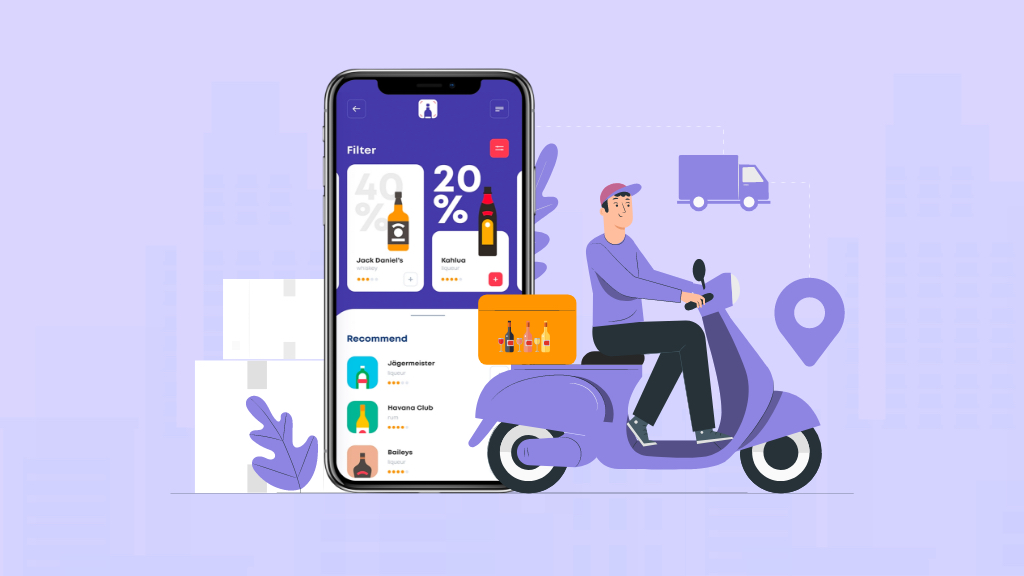Don't miss the chance to work with top 1% of developers.
Sign Up Now and Get FREE CTO-level Consultation.
Confused about your business model?
Request a FREE Business Plan.
A Complete Guide to Investing in “Soon to Be $200B” Online Food Delivery Industry
Table of contents

Is there a better thing than getting the food you love at your comfort? Obviously, not.
And that’s what the Online Food Delivery Industry is about! By making the whole process seamless – from searching the food you are craving to bring it on your plate – food delivery platforms are meant to deliver taste at your comfort.
The role these apps or platforms play in our day to day lives is the sole reason behind experts predicting that the industry will become worth $200B by the end of the year 2025.
Do you wish to take advantage of this billion-dollar market? Well, there are many who wish the same. But, it isn’t that easy. You have to be “Right on the Time” and with “Strong Weapons” to make it big in this industry.
Now, you must be wondering – what do I mean by right time and strong weapons here. Well, I have been a part of the on-demand app development industry for more than 7 years now and I have seen a number of apps failing as well as succeeding.
The only Mantra to get success here is acting at the right time. Find out the need of the hour and serve the users with the right solution. And by weapons – I mean technology. It doesn’t matter how strong your idea is until you back it with the right technology – it won’t get the success.
In this article, we will explore everything about this industry to find out how you can become a big player of this billion-dollar hunger game.
To start with, let’s first see why it is a good idea to invest in this industry now.
Invest Today In Online Food Delivery Industry to Earn More Tomorrow
The online food delivery industry brings together numerous technological advancements, businesses, and procedures with the goal of providing quick and convenient food delivery at affordable prices.
If you are thinking about building such an app but you are confused about whether you should or not – here is an infographic that will clear all your doubts:

The rate at which the demand for Food Delivery App Development is growing is a sign of the great potential that the market holds. As per MCkinsey, the online food demand is soon going to surpass the offline one.
The infographic above is just a small sign of how enormous the market is and how bigger it is set to become in the coming years. So, if you have any plans of stepping into the industry – this is the right time to do so.
Else you will miss on big profits, you may lack behind the competition or someone else will take your share. Now, instead of bragging about the obvious – Online Food Delivery Industry holds huge potentials – let us explore the concept as a whole, and find out how you should run your platform to make your venture count in this industry.
3 Famous Business Models Of the Online Food Delivery Industry
If we talk about the present scenario, there are three famous business models that are widely used by food delivery companies. You can think of all these three models when entering the Online Food Delivery Industry:
1. Order Only Model
This model is also known as an aggregator model. If you wish to adopt this business model, you just need to launch an app that will act as a platform where restaurants or eateries can meet the users.
An application following this business model offers choices to the users to search and order food and for the eateries to see and complete the request with no delivery support. Here is how these type of apps work:
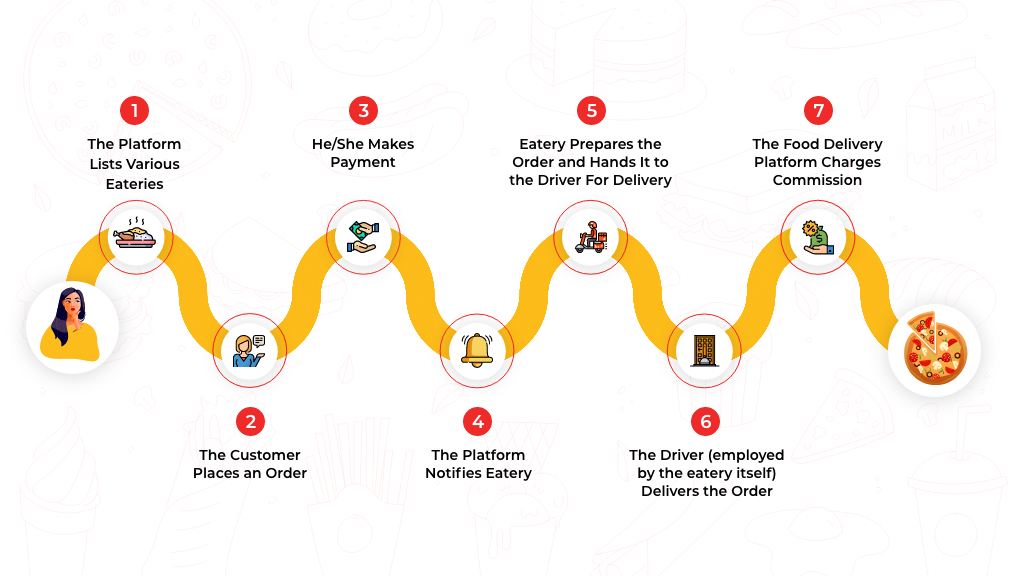
If you decide to follow the aggregator business model for running your food delivery venture – the main challenge that you will have to encounter is creating a wide network of restaurants.
Since the commission is the major revenue stream for order only platforms, they must invest extra efforts in connecting with as many restaurants as possible, including small local food businesses.
A wide network of eateries can serve as a competitive advantage for you and an incredible stimulus for users to utilize your service. But, attracting eateries to the platform may be hard and slow at the start. So you find precisely what to offer and what to ask for.
It is always a good idea to begin with a small region and contact local restaurants personally. After that, you can continuously expand your restaurant base in new locations.
2. Order and Delivery Model
Under this business model, you provide help to restaurants for delivering food to the end-user in addition to helping the users and restaurants meet on your platform. This is the model in which you handle the total service offering of the eatery (with the exception of food preparation).
Here is how these type of apps work:
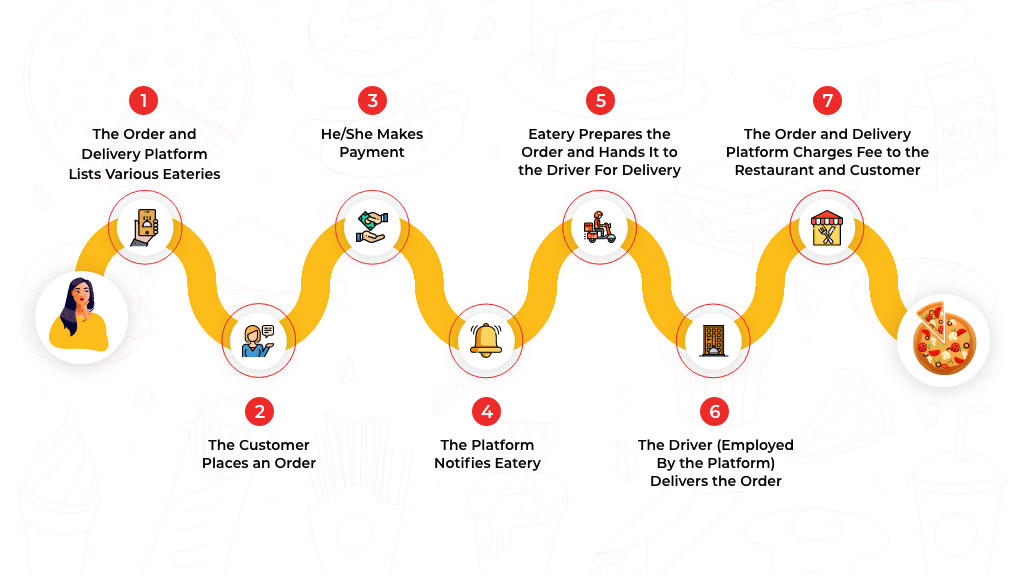
Utilizing this business model, you will be giving the end-users the alternative to choose the food from the menu, make an order and track where the order has reached while giving the eateries the advantage of tracking the order status and giving over the food to the delivery person who will be coming from your end and get paid for the order, with no efforts of preparing the food.
The main challenge that you will have to overcome in this type of business model comes while arranging a proper delivery system. Why? Because the delivery time affects the customer experience a lot. It is a key factor of satisfaction for 60% of users. And you must pay heeds to the same in order to get success.
3. Fully Integrate Model
In fully integrated models you will have to manage each and everything by yourself: may it be sourcing ingredients, preparing meals, or their delivery. These platforms can serve individual customers as well as corporate clients.
To understand their working – have a look at the following image:
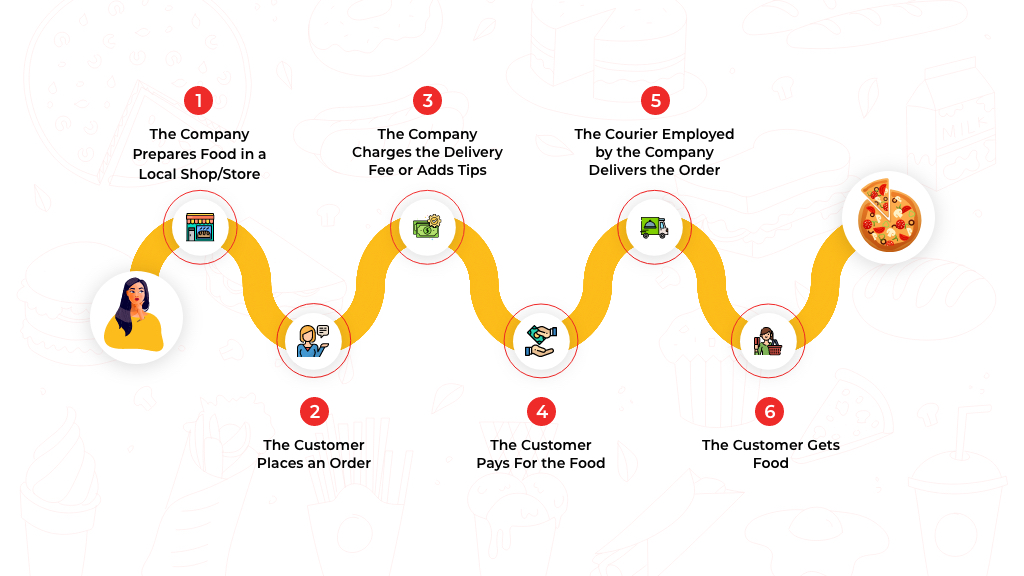
The operating cost of this type of platform comes out to be a bit higher as compared to other business models and optimizing this cost is the biggest challenge. These organizations require refrigerated trucks, ice packs, coolers, radiators, and other expensive equipment. So, when entering the online food delivery industry – this business model is not always recommended.
So, Which Business Model to Choose For Earning Maximum Profits?
There is tough competition in the food delivery market. The users look for comfort and convenience but that doesn’t mean in order to serve your users – you should compromise on your profits. So, if you want to be successful in your food venture, the trick is to make the right choice.
The choice of a profitable business model depends on the investment you can make, the location you are planning to target and your competition in that particular market.
Once you find out this data – it will be easy for you to select a business model for your venture.
What Do We Suggest?
Choosing a fully integrated model can give you an edge over your competitors as you can do everything all alone in such a kind of model. However, this kind of startup is a bit risky and can easily burn out.
Also, setting up a delivery channel can be costly for you. So in case you’re a newcomer to the food delivery market, we advise to begin with the most simple business model ‒ order only ‒ and then proceed onward once you have a strong base of partnering restaurants.
Need some inspiration? See How Zomato – a food delivery app that started with this simple business model and is today earning millions of dollars in revenue. Zomato’s success story is truly an inspiration for all and you can learn a number of things from this venture. Check Out the Blog for Details!
Now that you know about the business model of food delivery platforms and their details – let us check out the monetization models for such apps using which you can earn profits.
How to Make Money in the Online Food-Delivery Business?
There are various ways through which you can make profits utilizing your on-demand food-delivery mobile app. But the ones that are generally used are –
- Delivery Charges
You can use this monetization model if you are running your platform using the order and delivery model or fully integrated model.
When you – as a platform – provide your own delivery personnel, you can charge for delivery. There are various on-demand food delivery applications that depend on food-delivery revenue as their principal source like GrubHub, FoodPanda, UberEats, Doordash, and so on.
- Peak Pricing
Brands like UberEats use surge pricing when the demand goes excessively high. They limit the menu options and add an extra charge at the time of order placement. Despite the fact that the pace of incoming order comes out to be lower at that time, but the per delivery amount increases to a great extent.
- Commission Charges
Taking commission from the partnered eateries for each order that the client makes from them is one of the most tried and tested methods of generating revenue using the food delivery platforms.
Alongside generating good revenues, they additionally help in making a long-term relationship between the brand and the related restaurants.
- Advertising
Advertising is also one of the most sure-shot methods for producing a high amount of revenue. By giving eateries a little space in the Featured section or for running a video for them in the application home screen can be a very good method of generating revenues. Also, applications can earn a lot by using Google Adsense.
Now that you know all about how these online food delivery platforms work and earn profits – let us look at the features that should be included in your on-demand food delivery platform to reap the benefits of this billion-dollar Online Food Delivery Industry.
Also Read: How Does DoorDash Makes Money: Business and Revenue Model Explained
The Must-Have Features of an Online Food Delivery Platform
Despite what business model you follow to run your food delivery platform – It is crucial to know that there is not just a single application that you will require. In fact, there are 3 applications that you will need – one for each stakeholder – with various features and functionality to make the entire food delivery process seamless.
- Customer app: This app is going to be the one that will be installed by your user base. This application should be user friendly and help them compare various restaurants and offers.
- Delivery driver app: Your delivery personnel will also require an app to manage pick-ups and deliveries of orders.
- Restaurant Panel and Admin Panel: The restaurant’s owners with whom you will partner will also need a panel to see the orders received. Also, as an app owner you will require a robust admin panel to keep a track of everything. But, this purpose can be fulfilled with a web-based platform and won’t require an app for the same.
Now let us now look at the must-have features of these apps.
1. Customer App
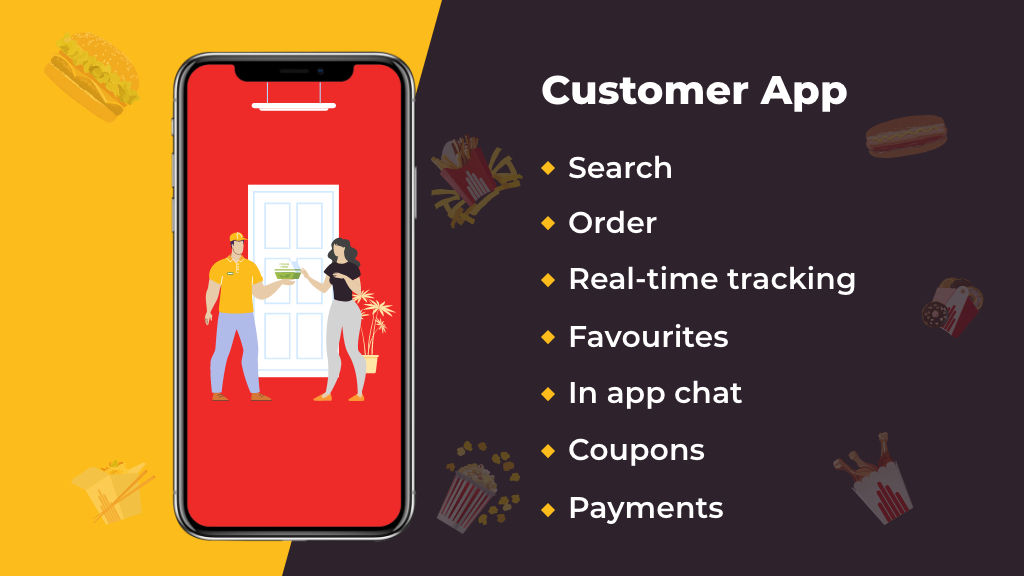
- Search
The customer should have the option to look and explore different restaurants and their offers in a seamless manner using your food delivery platform. They should have the option to search restaurants by cuisine, location, price, reviews, and names as per their preferences.
- Order
This is the main feature of a food delivery platform – your app should let users order anything they want in a few taps. They must be able to add or remove items from their cart, see total price and make the order easily.
You should also give them an option to reorder or cancel as and when they wish.
- Real-time tracking
Using a GPS or tracking system integrated into the application, users should have the option to track their request, from request preparation to shipment and delivery at the doorstep.
- Favorites
Your app should give users an option to mark their favorite dishes so that they can find them inside the application easily without the need of searching for it over and over again. This makes reordering very easy for them.
- In-app chat
Sometimes, customers have a thing or two which they want to discuss with the delivery person – so in-app chat is a must-have feature for your app. Also, it is important to list the contact details of the driver in-application along with an in-app chat option.
- Coupons
All top food delivery platforms have this feature to attract and retain a loyal user base. Users prefer to save money with discounts and that is why this feature is an absolute necessity in your food delivery app.
- Payment
While building up an online food ordering framework, making payments simple, quick and secure is extremely important. So, you must integrate secure payment gateways in your app to get paid easily.
2. Drivers App
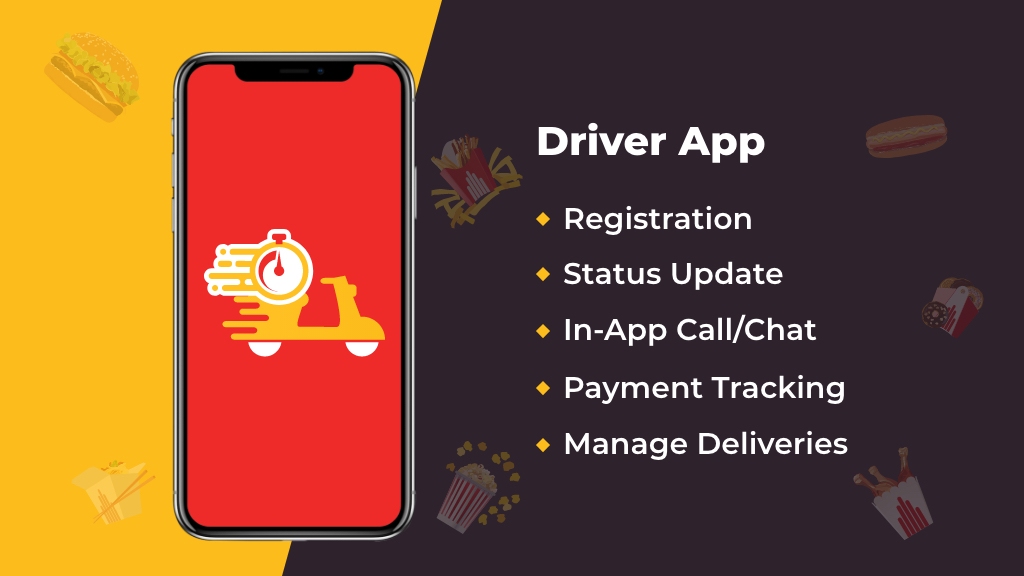
- Registration
It must be easy for a delivery person to register himself in-app. Consider signing them up using a simple username and password and verifying with Google, Apple or some other social media account. Using these methods, the sign-up process becomes very easy.
- Status Update
The delivery person should get updates if there are any changes in the order like location change, the order gets canceled or some other change. He should also have the option to update the user and the admin about the pick-up and delivery of each order.
- In-App Call/Chat
This feature is also a must-have as the food delivery person may have queries regarding customer location or their delivery preferences. A driver app should have an in-app chat option so that he could contact the customer directly.
- Payment Tracking
The drivers should have an option in-app to track their earnings so that they can have an idea of how much they have earned and which type of orders are helping them earn more money.
- Manage Deliveries
The delivery guys should receive orders in a timely manner. He could then choose which orders to acknowledge, reject or deliver ASAP. Utilizing this feature he can monitor every one of his deliveries.
3. Restaurant Panel and Admin Panel
- Manage Content/Details
The restaurant owners have to manage the name, contact, and address of their restaurants. They may also want to edit the pictures, menus, cost of items and offers. The restaurant panel of a food delivery platform enables them to do it all.
- Manage Orders
The eatery gets an order with the details like order locations, name of the item, payments, and the time of delivery. The owner then manages the orders as indicated by the priorities and schedules with this feature.
- Manage Deliveries
When an order is prepared, it is assigned to the delivery personnel. With this feature, the admin can keep track of the real-time location of the delivery guy from the time he leaves the eatery until he delivers the order.
3 Advanced Features to Make Your Online Food Ordering Platform StandOut
Millennials are the most important customers of a food ordering system. However, satisfying their demands through easy ordering, fast checkout, and instant delivery are not the only benchmarks of the industry. If you want to make your online food ordering platform standout in the market – you must add some advanced features in it and these can be:
- Take Order From Social Media
Domino’s was the first to present the ‘order by tweet’ feature and it worked like magic for them resulting in increasing orders.
Food ordering and delivery platforms are utilizing the power of social media to set trends that the audience or millennial at large will adopt. Using this feature, you can make ordering one step easier for your users. So consider integrating it in your app/website.
- Integrate Virtual Assistants
The popularity of Virtual Assistants is increasing day by day and their use in food ordering platforms is not a thing of the future. So, take the experience of your users a stride ahead by letting them order using a bot in your platform – the Virtual Assistants will be taking orders, telling users about the best offers available and doing everything so that the users can order hassle-free
GrubHub has partnered with Amazon’s Alexa to integrate this feature in their app. When a user tells Alexa what exactly they want to order, the action is executed by an announcement about the estimated delivery time.
- Take Order from Cars
Ordering food from cars was first made possible by Pizza Hut. The organization partnered with Visa and Accenture to develop an in-car pizza ordering framework. The process was incorporated in the car’s dashboard, which implied drivers are able to place the order using their voice without moving their hands from the steering wheel.
I hope now you know the tips and tricks to enter in the online food delivery space. Now, let us see how much investment you will have to make in order to be the next big player of the food delivery market.
Also Read: Why Your Restaurant Needs a Mobile App?
How Much Does it Cost to Develop a Food Delivery Platform?
In spite of the fact that there are various factors that together add on to the estimation of food delivery application development cost, I will try to give you a rough idea here.
Depending on the features and functionalities that you are planning to add in your food delivery platform and the food delivery app development company that you will hire, the expense would come somewhere around $20,000 to $40,000.
This expense includes everything from mobile app designing, development of iOS and Android apps to app testing and its launch in the market.
With this, we have now seen all that you need to know in the current day for entering into the on-demand food delivery app market. Now it is time for you to hit it with a bang! Let’s create wonders together.

Rate this article!
(2 ratings, average: 5.00 out of 5)
Join 60,000+ Subscribers
Get the weekly updates on the newest brand stories, business models and technology right in your inbox.

Nikhil Bansal is the Founder and CEO of Apptunix, a leading Software Development Company helping startups as well as brands in streamlining their business processes with intuitive and powerful mobile apps. After working in the iOS app development industry for more than 10 years, he is now well-equipped with excellent problem-solving and decision-making techniques.

App Monetization Strategies: How to Make Money From an App?
Your app can draw revenue in many ways. All you need to figure out is suitable strategies that best fit your content, your audience, and your needs. This eGuide will put light on the same.
Download Now!Subscribe to Unlock
Exclusive Business
Insights!
And we will send you a FREE eBook on Mastering Business Intelligence.


